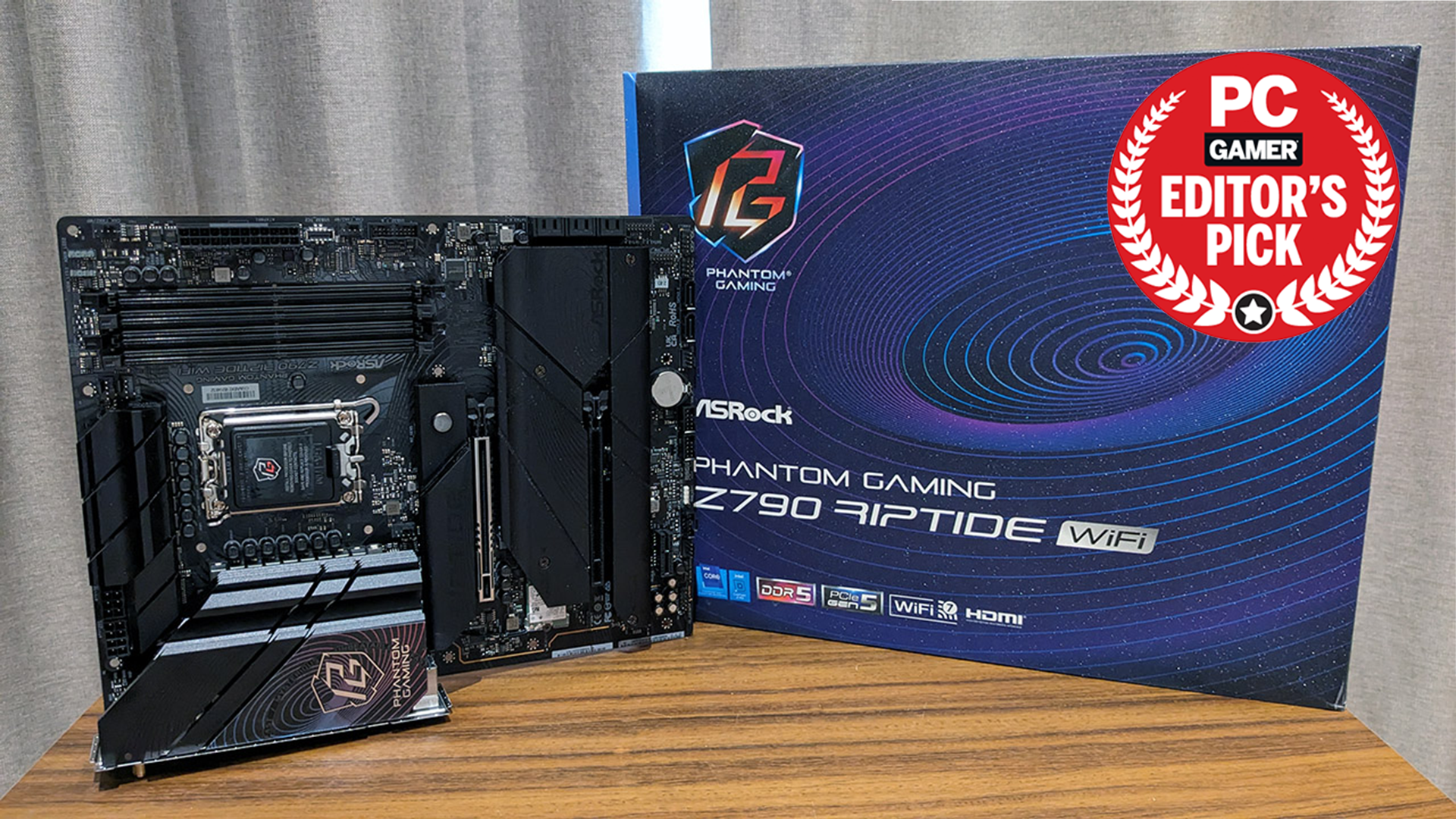Our Verdict
The ASRock Z790 Riptide WiFi is a superb offering for its price. It's packed with useful features and storage potential that puts most boards at its price point to shame. On top of that, it's a mature offering with DDR5-8000+ memory support and a demanding 14900K isn't beyond it.
For
- Loads of storage potential
- WiFi 7
- Terrific value
Against
- The VRM heatsinks are so-so
- A rear 20Gbps USB port would be nice
PC Gamer's got your back
The latest Z790 refresh board we have in for review is the ASRock Z790 Riptide WiFi. It's a part of ASRock's Phantom Gaming lineup. It's an affordable option that comes with out of the box support for Intel's 14th Gen processors, though of course it supports 12th and 13th Gen processors as well.
At just $250, the Z790 Riptide WiFi has features that make some more expensive boards look pretty average in comparison.
Some will say these latest Z790 motherboards are the same as their predecessors with a new coat of paint. There is a case to be made for that viewpoint, but not everyone upgrades every year. If you're upgrading from a system that's a few years old, then Z790 refresh models have a lot of appeal. They include the latest connectivity features, electrical refinements and support for fast memory for starters. And although many Z790 refresh boards have taken yet another step up in price, some boards like the ASRock Z790 Riptide still manage to offer a whole lot for your money.
At just $250, The Z790 Riptide WiFi has features that make some more expensive boards look pretty average in comparison. It includes WiFi 7, support for DDR5-8000+ memory, five M.2 slots and eight SATA ports. Add to that PCIe 5.0 SSD support and you've got an excellent core feature set.
The Z790 Riptide WiFi is a clear step forward over its Z790 Riptide predecessor. As the name suggests, the latter doesn't include WiFi at all. The new model features faster memory support, an improved VRM, a refined audio section, and curiously, an rear-mounted embedded DisplayPort connector suitable for use with ASRock's 13.3-inch side panel kit.
The Z790 Riptide WiFi features a simple all black aesthetic with a little splash of metallic blue and purple above the rear I/O. There's a strip of RGB LEDs under the bottom most M.2 heatsink which is very bright if you look directly at them. On top of that you get three ARGB headers plus another RGB header that supports 36W strips. There are seven fan headers, so it's a cooling and RGB friendly option.
ASRock Z790 Riptide WiFi overview and specs
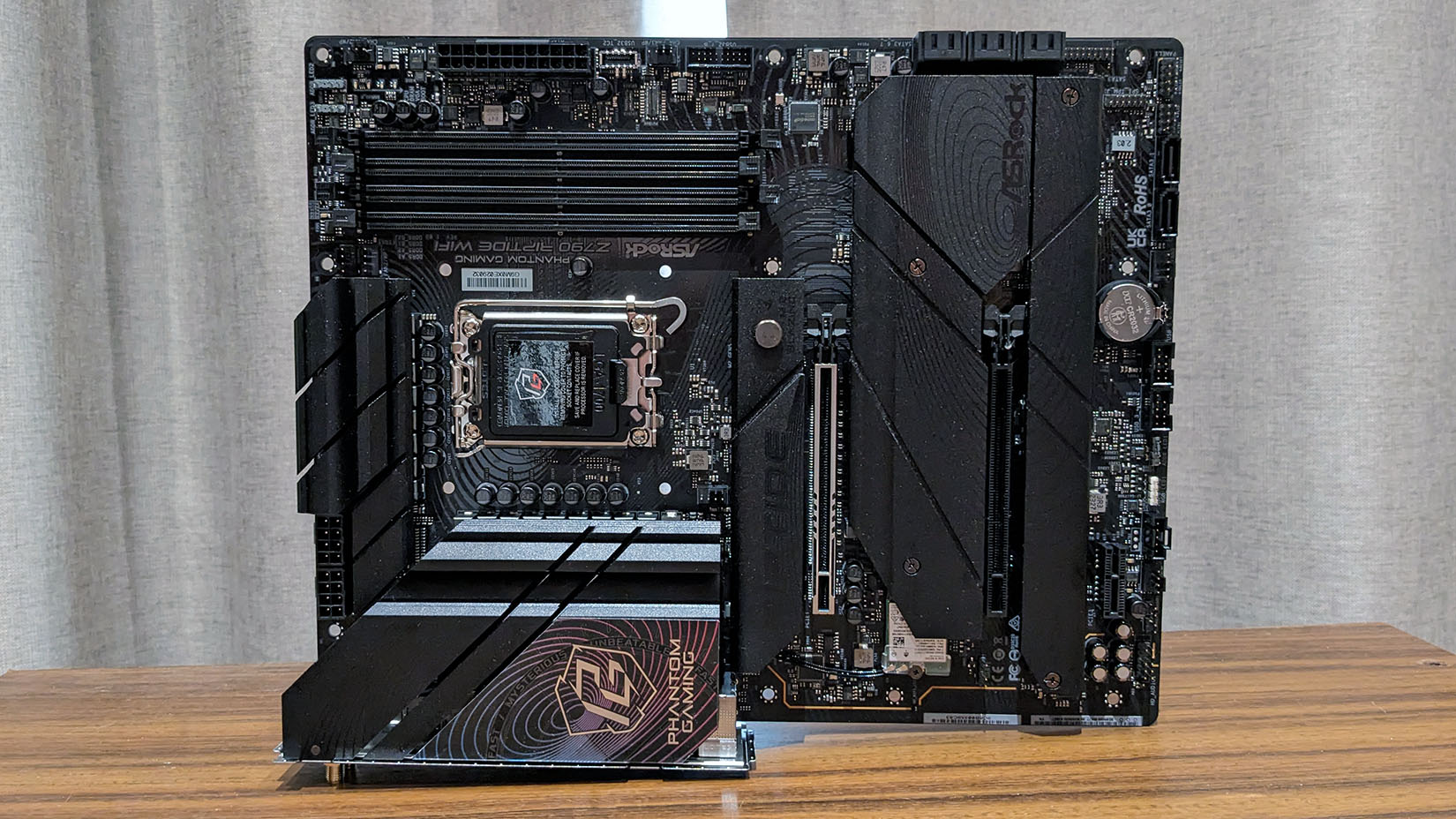
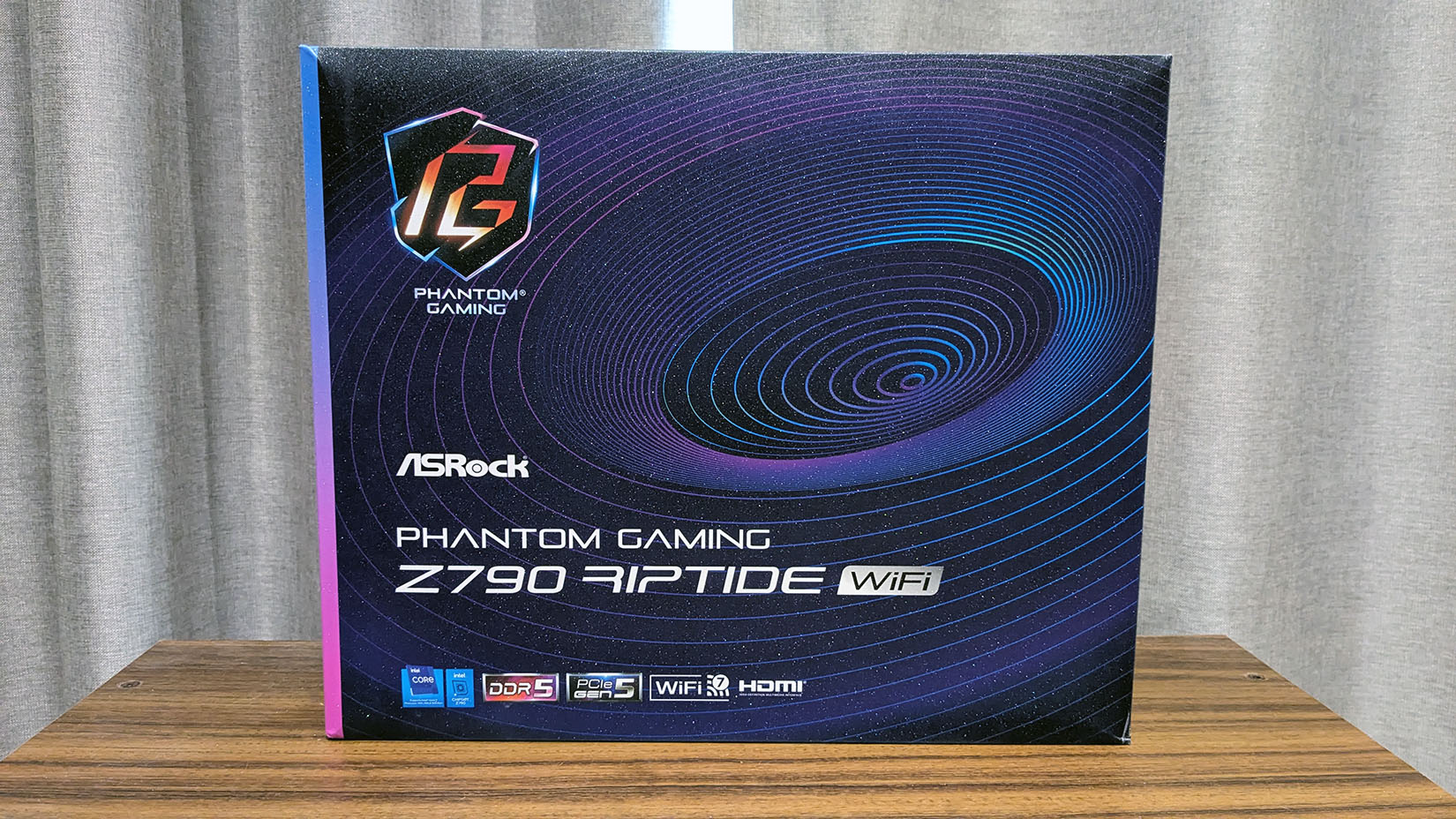
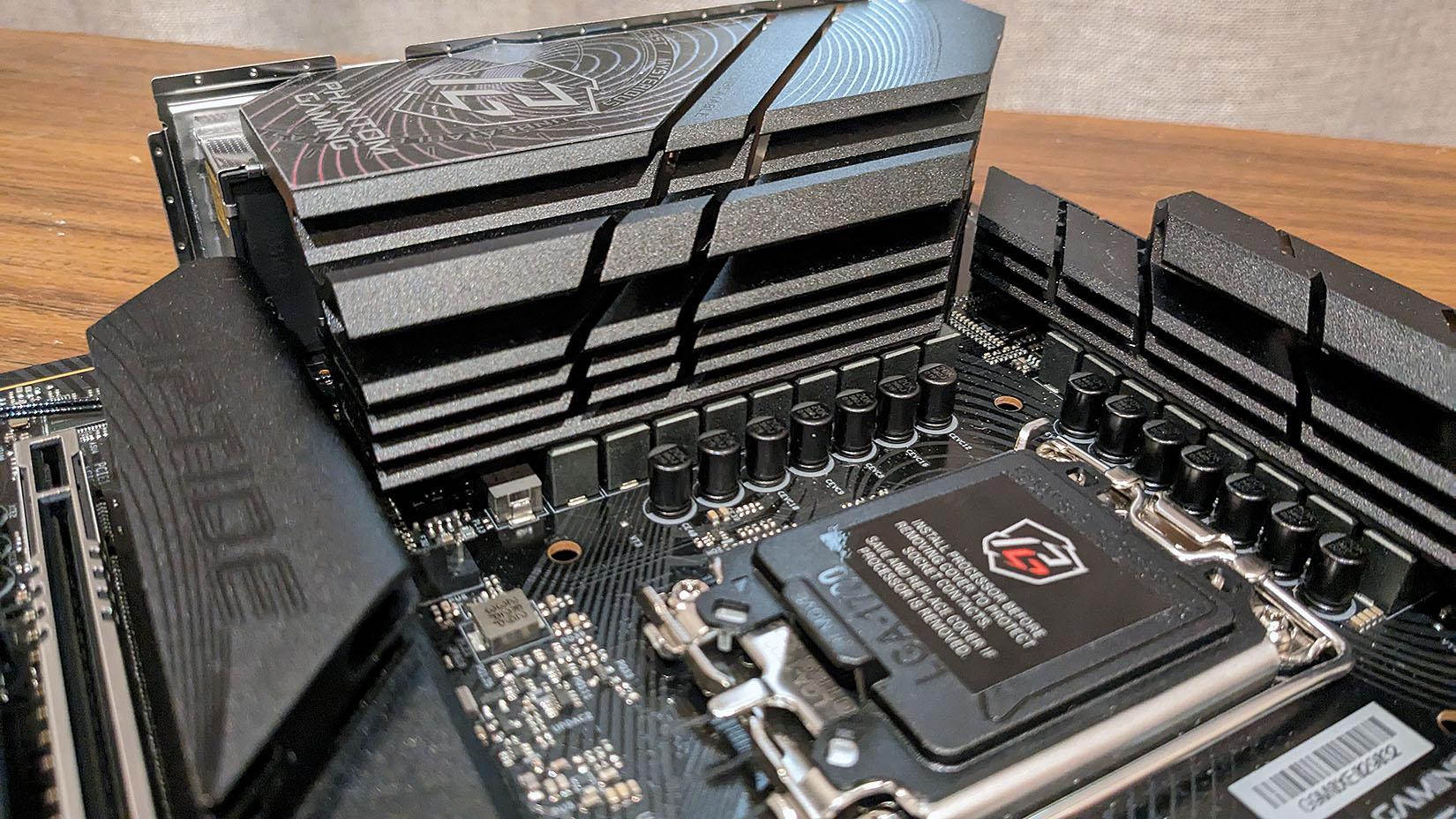
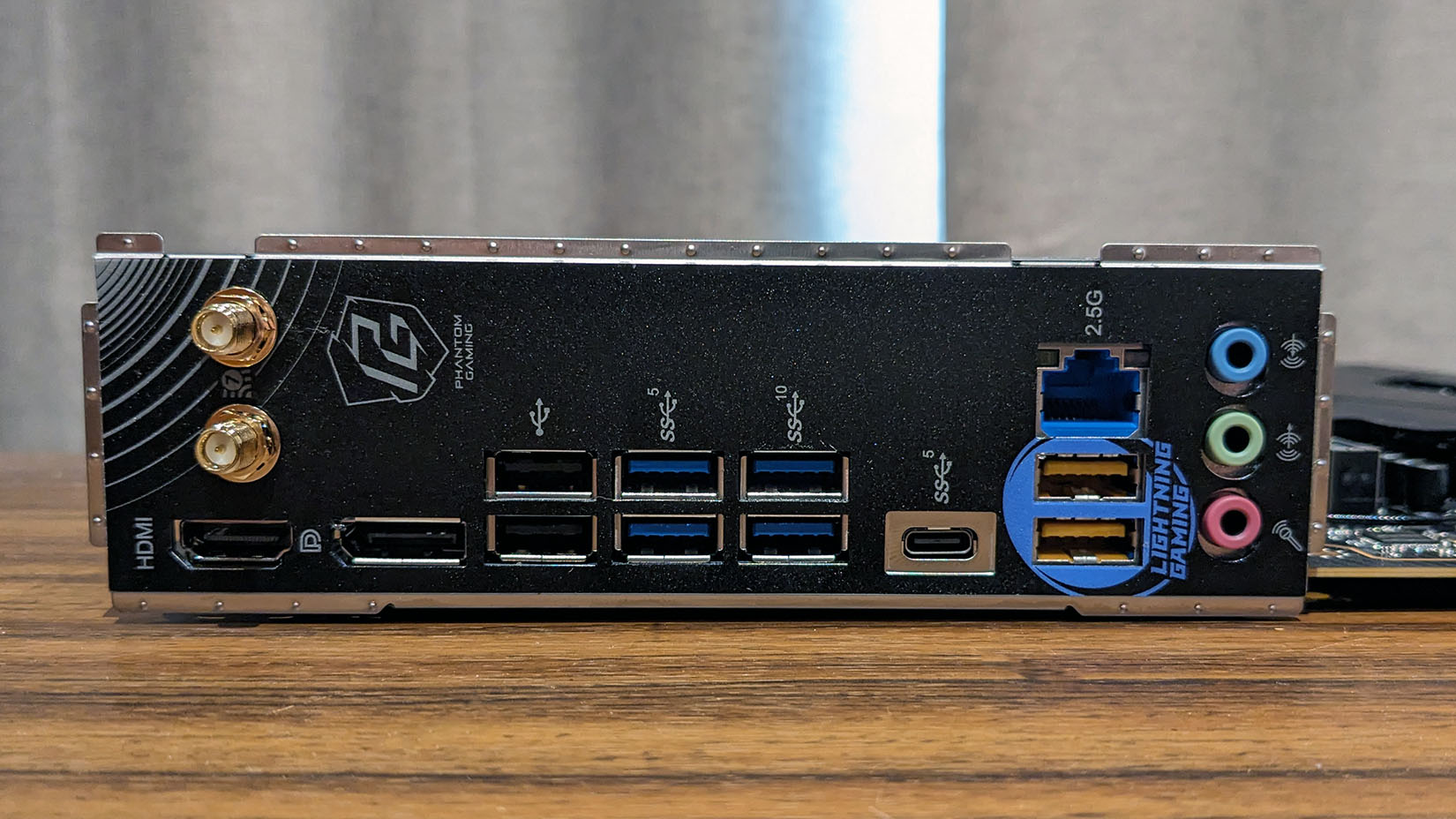
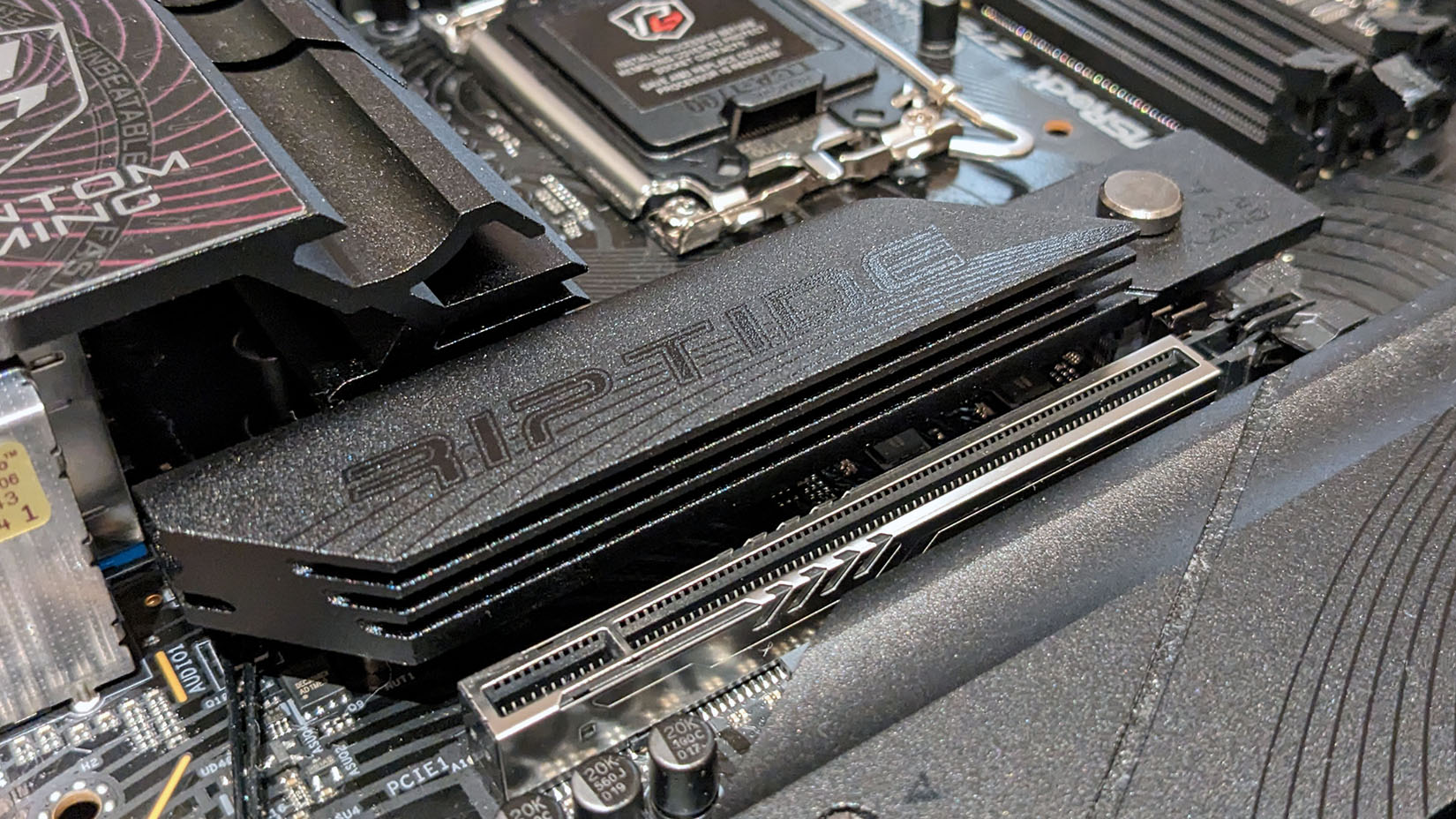
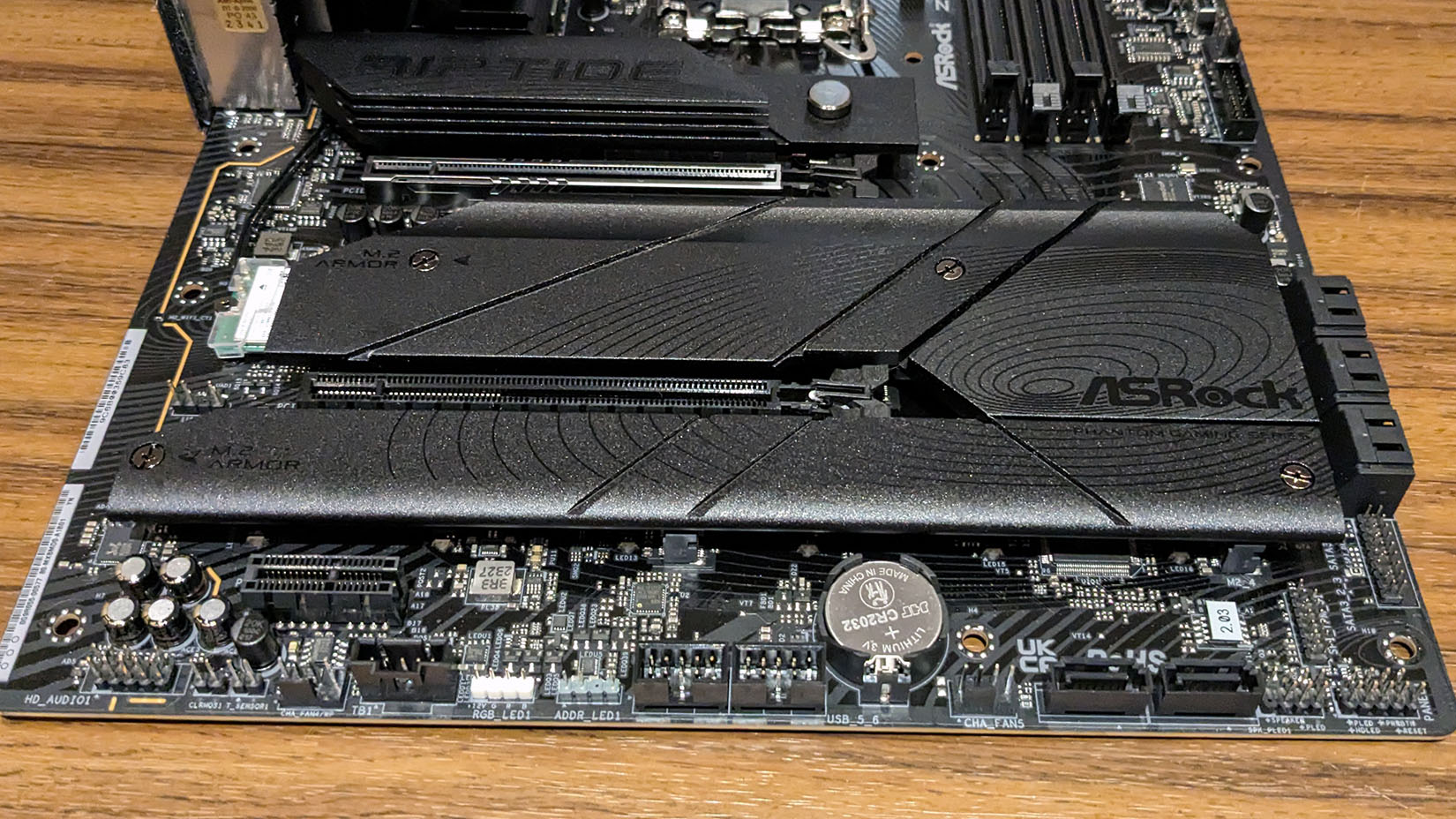
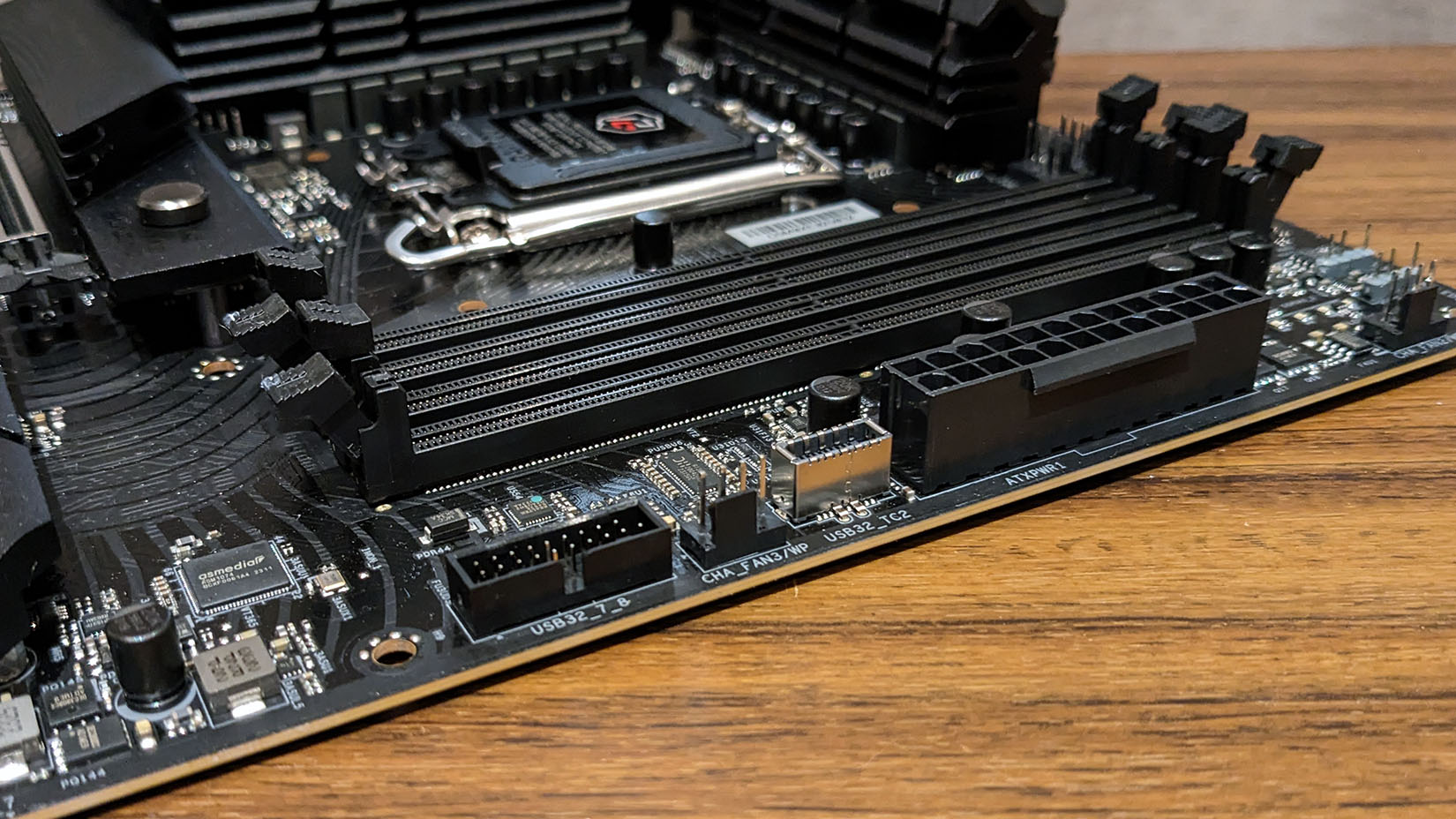
Spec wise, there's a lot to cover. The four memory slots support speeds of 8000MHz+. Dual rank modules are supported at 6800MHz+ while a full 192GB complement of four dual rank modules can run up to 5600MHz+. That says a lot about the improved memory controllers of 14th Gen processors and the electrical tweaks of Z790 refresh boards that are now better able to handle large amounts of high-density memory.

Socket: Intel LGA 1700
CPU compatibility: Intel 12th, 13th & 14th Gen desktop processors
Form factor: ATX
Memory support: DDR5-8000(OC), up to 192GB
Storage: 5x M.2, 8x SATA
USB: Up 1x USB 3.2 Gen 2x2, 2x USB 3.2 Gen 2, 7x USB 3.1 Gen 1, 6x USB 2.0
Display: 1x eDP 1.4, 1x DP 1.4, 1x HDMI 2.1
Networking: Killer E3100G 2.5G LAN, WiFi 7
Audio: Realtek ALC1220
Price: $250 / £TBD / AU$TBD
Storage-wise, the Z790 Riptide WiFi puts some boards at twice the price to shame. It features no less than five M.2 slots. The primary slot supports PCIe 5.0 SSDs and it comes with a reasonably high surface area heatsink that's attached via a simple screwless mechanism. That's becoming an increasingly common feature, and a welcome one at that. The other four slots all support PCIe 4.0 drives and all slots are covered by screw-in heatsinks.
Affordable boards with five slots are uncommon enough, but when you add to that eight SATA ports you've got a motherboard with best in class storage potential. There aren't many boards at any price that support that many drives.
A standard ATX board only has some much area, so with five M.2 slots, the PCIe slot complement is somewhat restricted as a result. The primary x16 slot supports PCIe 5.0 cards. There's a secondary physical PCIe 4.0 x16 slot (x4 electrically) and a PCIe 3.0 x1 slot. The secondary slots are well positioned, and won't be impeded by a triple slot graphics card.
The VRM is a strong one for a board at this price. It's a 16+1+1 phase design with 90a stages, which means it will handle any LGA 1700 processor you care to name. The heatsinks are relatively chunky, but they are not connected via a heatpipe, and I found them to get hot to the touch. Not alarmingly so, but you'll definitely need a good amount of airflow if you plan to regularly thrash a Core i9 14900K or 13900K. That's a combination that probably is not going to be too common with a $250 board, so I have no real complaints.

The rear I/O has a decent enough complement of ports. Though I would like to see a 20Gbps USB port, I can't really complain at this price. There is a 20Gbps case header, so that all but makes up for it. The rear USB complement is made up of two Type-A 10Gbps ports and five 5Gbps ports, one of which is a Type-C. There are also two USB 2.0 ports. ASRock refers to two of the 5Gbps ports as Lightning Gaming ports. It says they are connected to two different controllers with the aim of minimizing mouse and keyboard latency. Sounds good. I guess.
The Z790 Riptide WiFi comes with a DP 1.4 port and HDMI 2.1 port. That's in addition to the aforementioned eDP connector which supports 1080p at 60Hz.

Ethernet duties are provided by a Killer E3100G 2.5G controller. That's becoming a rarer sight on modern motherboards as manufacturers tend to use Intel branded i225 and i226 variants for 2.5G networking . The star of the networking show is the inclusion of WiFi 7. I wouldn't have criticized ASRock if it went for a 6E controller at this price, so the inclusion of WiFi 7 is very welcome indeed.
Audio duties are handled by a Realtek ALC1220 codec. It's a welcome upgrade over the ALC897 of its non WiFi predecessor. ASRock has added separate PCB layers for each stereo channel and there's impedance sensing for different types of headphones. Nahimic software is included.
ASRock Z790 Riptide WiFi performance
System Performance
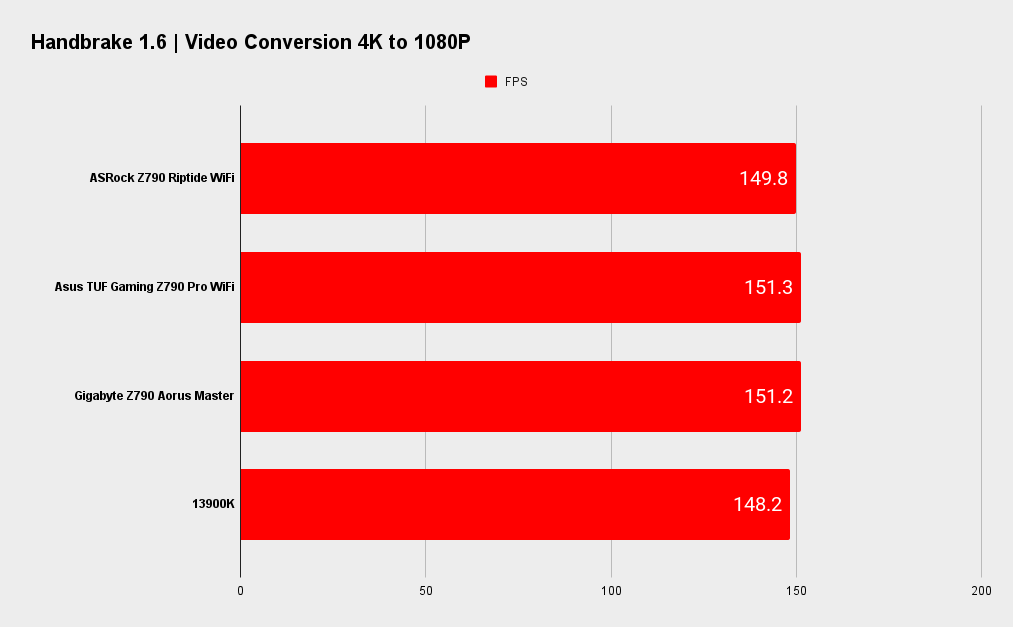
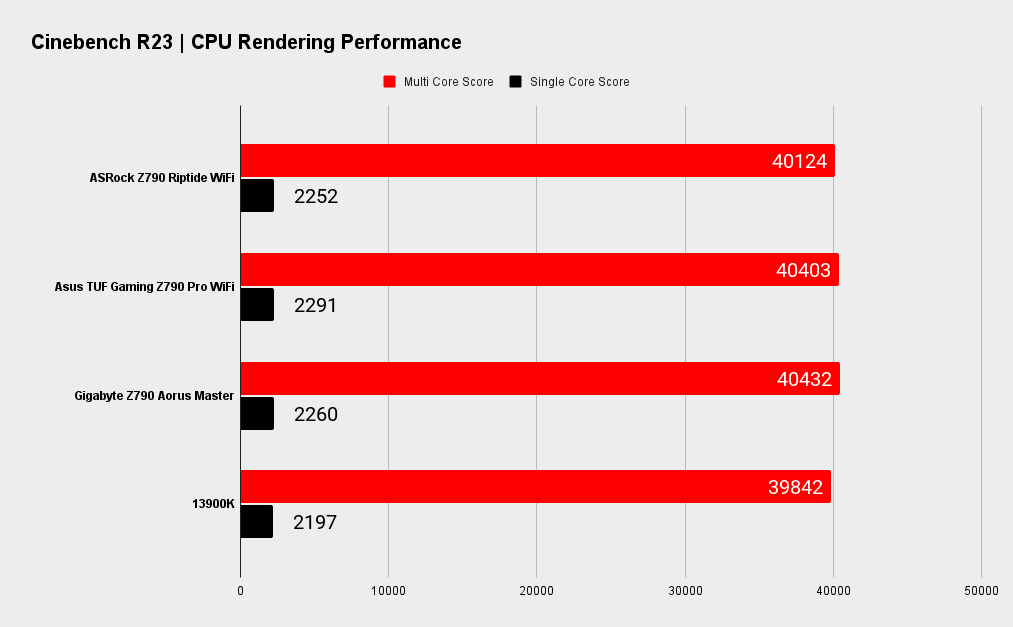
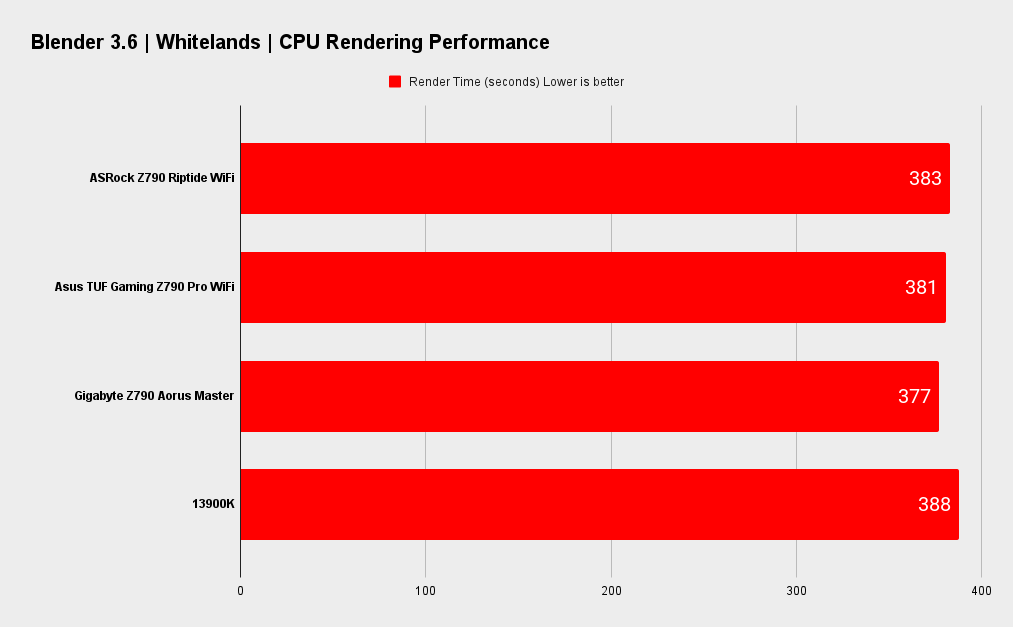
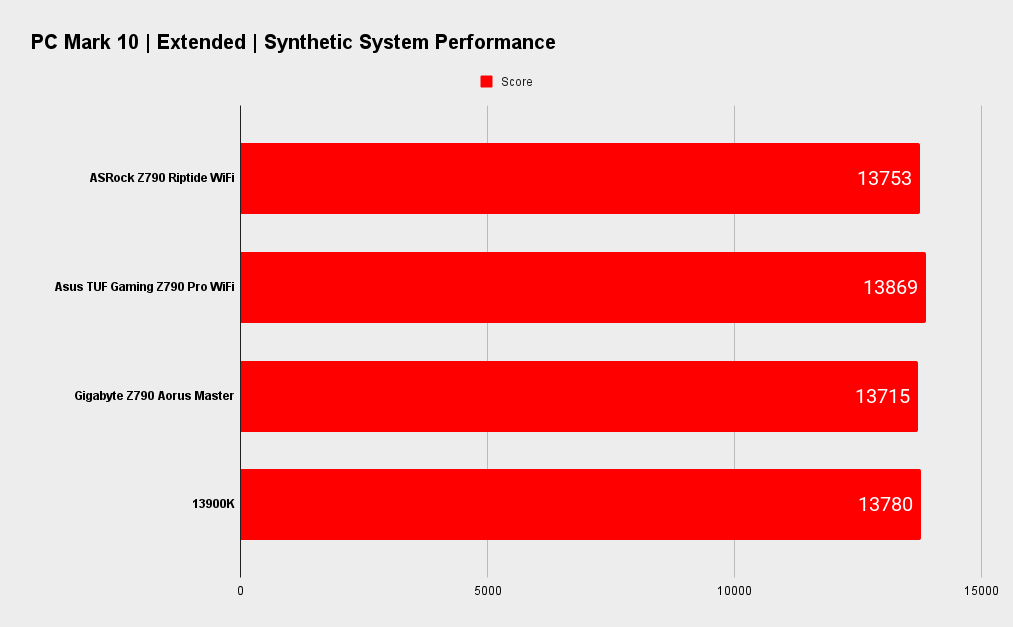
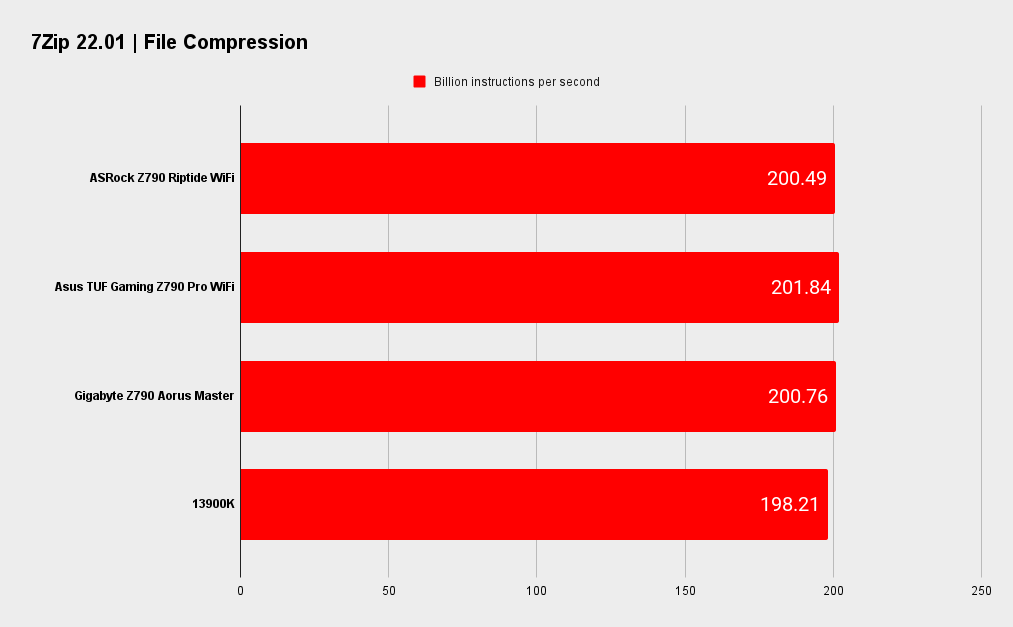
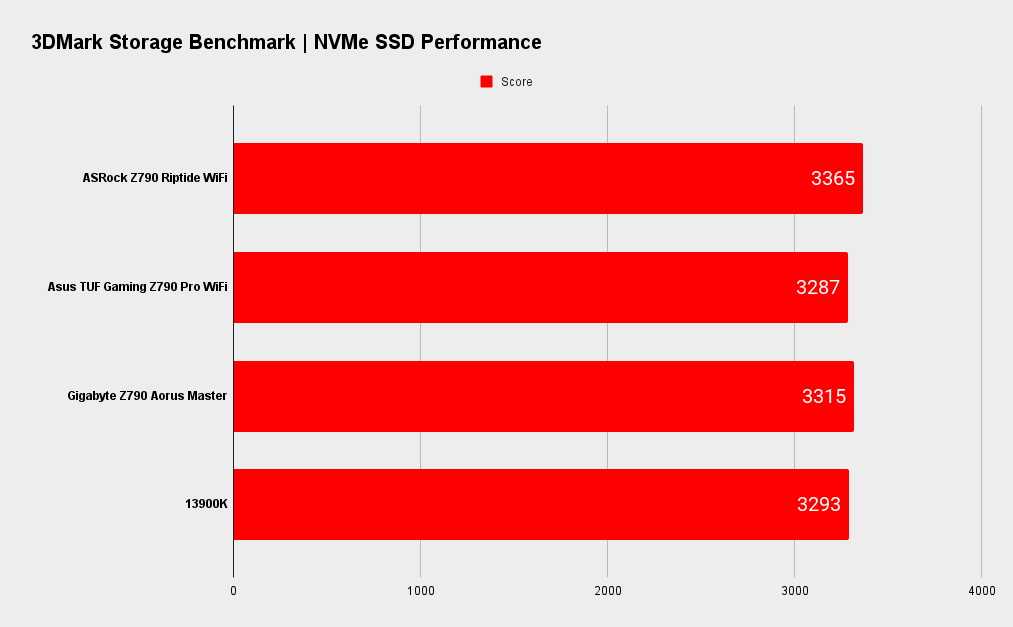
Gaming Performance
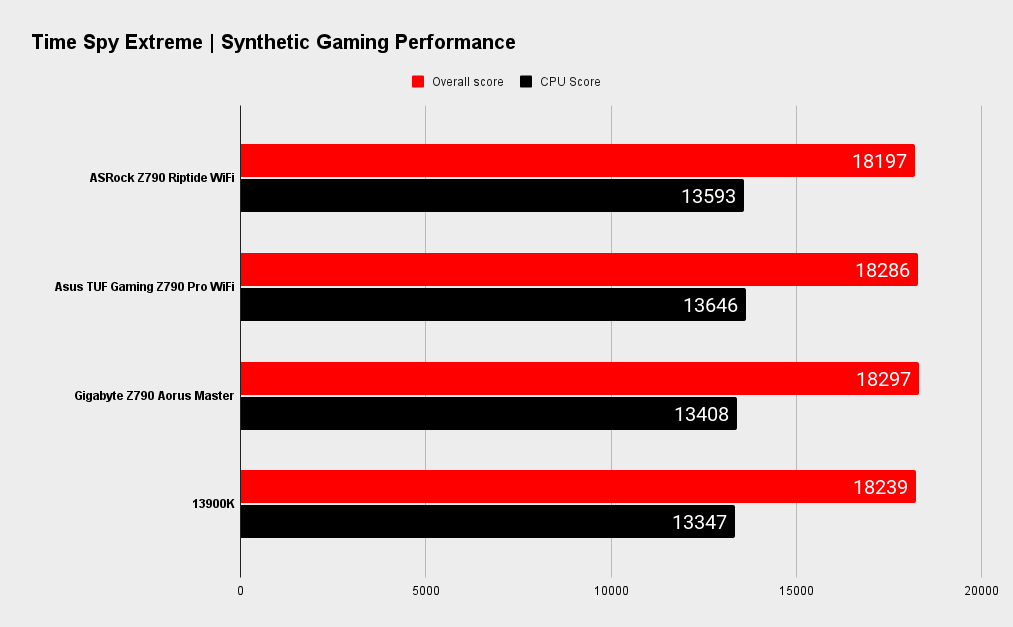
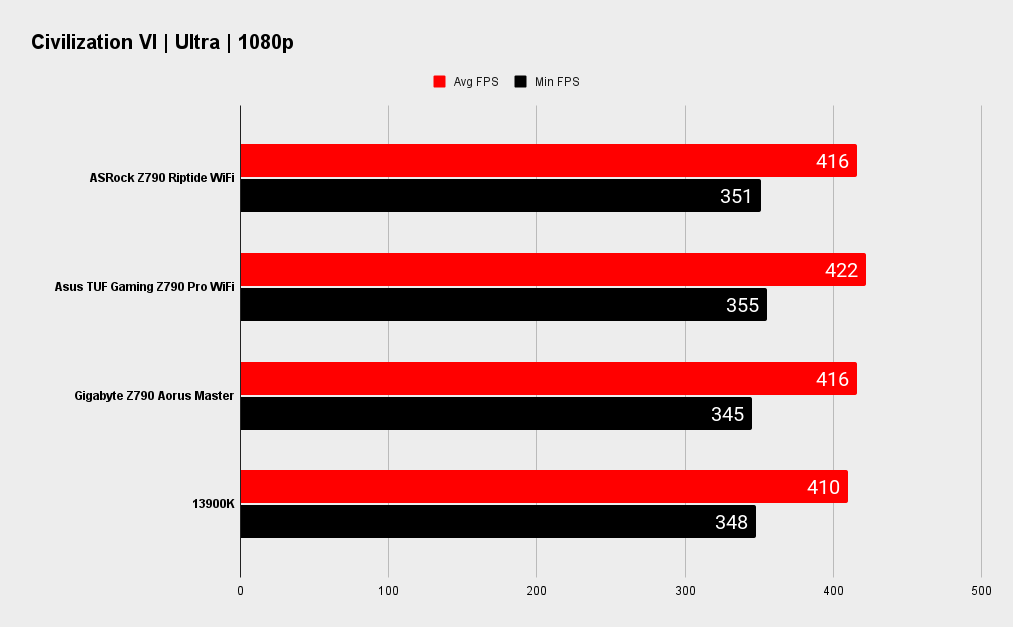
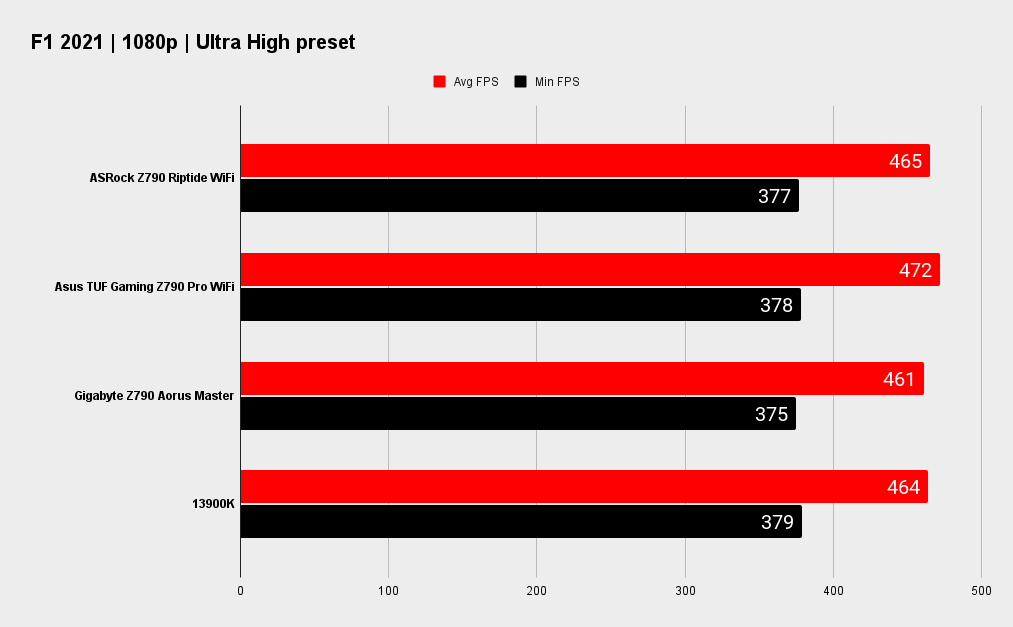
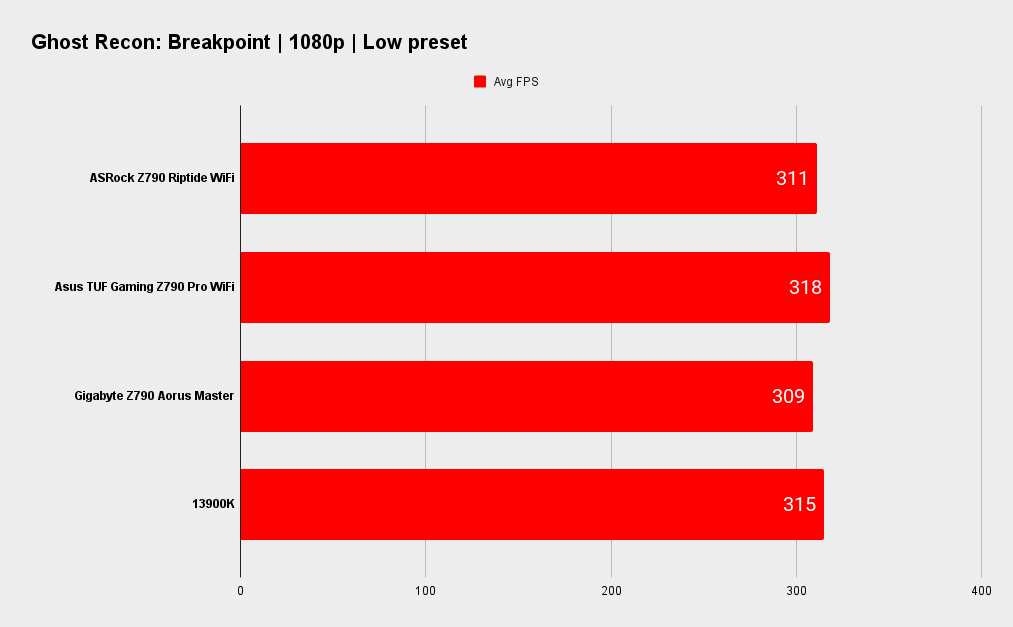
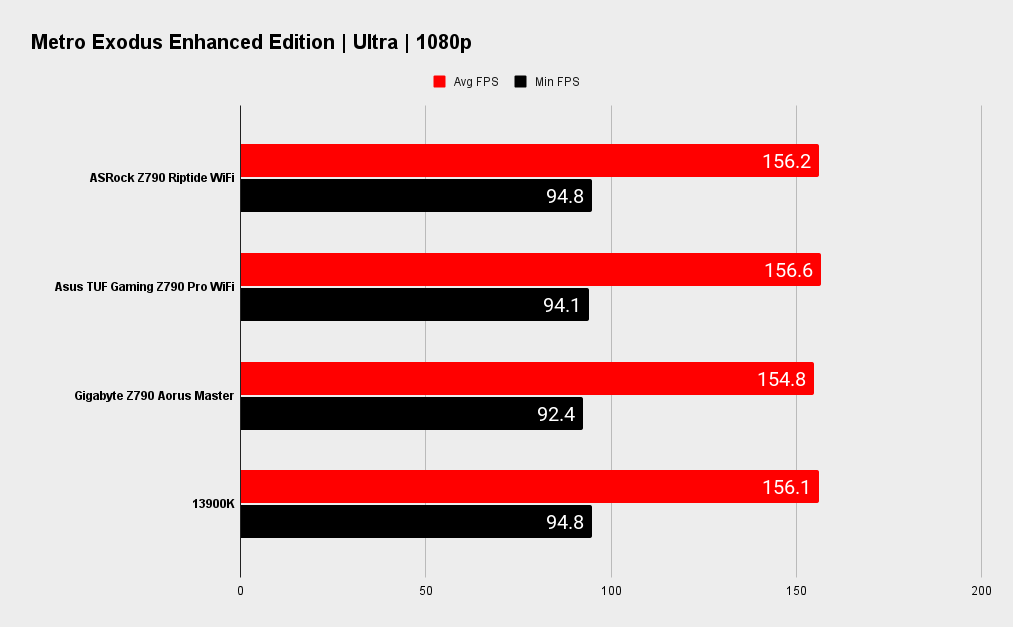
ASRock Z790 Riptide WiFi analysis

The Z790 Riptide WiFi, when tested with a 14900K performed adequately. I did note that the bus speed ran at around 99.75MHz. In theory that'd lose you 0.25% of performance. Not that it matters.
The same general conclusions apply to all Z790 refresh boards. After years of experience, BIOS engineers are very familiar with the underlying microcode of LGA 1700 processors and motherboards. Like-for-like systems are almost exclusively differentiated by small performance differences.
CPU: Intel Core i9 14900K
Graphics: Nvidia GeForce RTX 4090 Founders Edition
RAM: 2x 16GB G.Skill Trident Z5 DDR5-6000 C36
Storage: 2TB Seagate FireCuda 530
Cooling: Cooler Master PL360 Flux 360mm AIO
PSU: Corsair AX1000
The ASRock did particularly well in the 3DMark storage test. Though not the last work in SSD testing, the two runs were both faster than any other refresh board I've tested to date. That's a cherry on top for the Z790 Riptide WiFi's class leading storage potential.
When it comes to gaming performance, the motherboard makes little difference compared to the CPU and particularly GPU. The Z790 Riptide WiFi won't have any problem at the heart of a gaming system, even with a 14900K and RTX 4090, as long as you have good case airflow to keep the VRM cool with that kind of combo.
Armed with a set of G.Skill Trident Z DDR5-7200, I was able to hit DDR5-8000 but couldn't get 8200Mhz stable. It's possible my kit is not capable of reaching those speeds. I won't know until I get hold of a DDR5-8000 kit, which I will get my grubby mitts on soon. In general, the board did everything I asked of it. Boot times were good—particularly compared to AM5 systems, and I've always liked the sub-menu layout of ASRock's BIOS.
ASRock Z790 Riptide WiFi verdict

✅You want support for lot of storage. The Z790 Riptide WiFi includes five M.2 slots and eight SATA ports, making one of very few LGA 1700 boards at any price to provide that much storage potential.
✅ You're looking to stretch your budget. The Riptide's core feature set is excellent for $250. Its affordability allows you to allocate more money towards a better CPU or GPU.
❌ You already have a Z690 or Z790 board. If you've already got a previous generation LGA 1700 board, you're probably better off updating its BIOS and going 14th Gen with that.
The latest generation Z790 motherboards begin at around the $190 to $200 mark, but those with WiFi 7 begin at about the ASRock Z790 Riptide WiFi's $250 price. That alone would earn a compliment, but when you add to that five M.2, one of which has PCIe 5.0 support, eight SATA ports, a VRM that's a step above that of entry level boards, front 20Gbps USB and DDR5–8000+ support and suddenly a whole lot of more expensive motherboards look overpriced.
Sure, if you want 10GB LAN, a fancy OLED screen, an M.2 add-in card, or a gazillion amp VRM for ln2 overclocking then you'll have to pay more, but for those of you looking for a solid, mature and feature packed budget option, I find it hard to look past the ASRock Z790 Riptide WiFi.
In the end, the ASRock Z790 Riptide WiFi doesn't miss a beat. It's a class leading LGA 1700 motherboard with an unbeatable set of features for the money
Would it be nice to have a rear 20Gbps USB port? Sure it would. Having VRM heatsinks with a little more beef would be nice too, but you can't have everything at the $250 price point. Admittedly, you won't be able to drop a next-gen processor in, but that's true of all LGA 1700 boards.
But one or two shortcomings are not even that. They're wishlist items. In the end, the ASRock Z790 Riptide WiFi doesn't miss a beat. It's a class leading LGA 1700 motherboard with an unbeatable set of features for the money. I have no problems giving it an Editor's Choice award.
The ASRock Z790 Riptide WiFi is a superb offering for its price. It's packed with useful features and storage potential that puts most boards at its price point to shame. On top of that, it's a mature offering with DDR5-8000+ memory support and a demanding 14900K isn't beyond it.

Chris' gaming experiences go back to the mid-nineties when he conned his parents into buying an 'educational PC' that was conveniently overpowered to play Doom and Tie Fighter. He developed a love of extreme overclocking that destroyed his savings despite the cheaper hardware on offer via his job at a PC store. To afford more LN2 he began moonlighting as a reviewer for VR-Zone before jumping the fence to work for MSI Australia. Since then, he's gone back to journalism, enthusiastically reviewing the latest and greatest components for PC & Tech Authority, PC Powerplay and currently Australian Personal Computer magazine and PC Gamer. Chris still puts far too many hours into Borderlands 3, always striving to become a more efficient killer.
